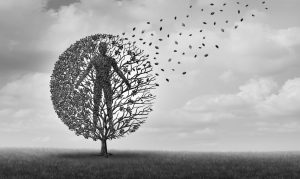Change and adapting to change is one of the primary ingredients of grief itself. When something is altered or changed it requires adjustment. Sometimes the adjustments are minor or insignificant, but the greater the change, the greater the adjustment. Some adjustments are for the better and can be challenging but exciting, but some changes are closely related to losing something and adjusting to a new normal that is less than ideal.

While one normally thinks of death and loss as the key changes and adjustments in life, one of the biggest changes in life is aging. Aging sometimes can be exciting in one’s younger years but it can also be terrifying as middle age begins. There are numerous fears that accompany aging. Some of the fears are associated with primary changes while others are secondary and flow from the initial adjustments. Some adjust and cope better, but ultimately the losses associated with aging usually are more focused on what one is losing than the gaining of any potential advantages.
The article, “The Grief of Growing Older” Josh Gressel takes a closer look at aging and the adjustment and losses associated with it. He states,
“So much about growing older seems connected to loss: loss of muscle, loss of drive, loss of energy, loss of memory. If the first half (at least) of our life was all about growing a family, acquiring a profession, and building a nest egg, it can be very challenging to witness nature taking its course with our bodies and our minds and watch ourselves diminish, at least according to the metrics we’ve previously used to measure ourselves.”
“The Grief of Growing Older”. Gressel, J. (2023). Psychology Today.
To review the entire article, please access here
Commentary
Ultimately change is difficult although change occurs everyday. Some may cope better than others and some changes may be more delightful than painful, but ultimately change creates adjustments. Some adjustments can be painful and difficult. With aging, some change is good and some change is bad. One needs to have positive mindsets and coping skills to enjoy each phase of aging and to understand that change is not ultimately the end of the world. Still, it is OK to grieve the loss of certain youthful attributes but one must be able to cope and enjoy the present.
Physical and Mental
As the Gressel points out, one of the biggest adjustments to aging is physical and mental loss. One cannot escape the reality that eventually one will enter into middle age and even older age losing former abilities. Losing strength, mobility and agility can take time to adjust to. In addition, one’s physical appearance can change with less hair, more fat, and more wrinkles. These facts of aging can be dreaded or accepted with grace. Many utilize many ways to stay younger looking but eventually one must succumb to mother nature and learn graceful ways to embrace older age.
Middle Age Crisis

As one ages, psychology, especially Erickson’s phases of life reflect on how one has matured and grown from a completely dependent child to a thriving adult. One naturally reflects on success and what one has generated and added to life itself. Once beyond the material and financial things, one looks at family and legacy itself. For some, when things have not gone as well as hoped and one begins to age, it can trigger a crisis response. One may revert to more immature behaviors or look for more superficial things to fill the void. The adjustment to where one is at a certain age can be graceful or terrifying depending on one’s life. Some may be able to celebrate where they are while others may frantically search to find meaning.
The Golden Years
While many dread becoming truly older and crave their youth and prime filled years, others again can reflect and find joy in their accomplishments. For those the adjustment to elderly life is easier. They can find retirement and grandchildren as a positive change, but others may worry about death, or regret life long decisions. Hence again the adjustment to losing certain abilities but gaining other things depends upon one’s mindset. Is the glass half empty or half full?
Aging is Perspective
Is the grief of aging due only to loss of youth or is it also due to loss of opportunity? With aging, there comes losses, but also many gains. The losses of family, the decrease in mental abilities and physical looks, poorer health and memories long gone are sometimes overwhelming and one forgets the financial issues of youth, or the legal troubles of youth, or the uncertainties of it. Those who are more prepared in life, tend to look more fondly on their past life and relish their accomplishments and look to share what they know with the younger generation. They take the change of aging and are able to make it more positive than negative. They embrace the financial security, the retirement, the maturity, the respect earned, and the life and legacy built. Those who do not, tend to tremble in the aging process, wishing for more time, or seeking the fountain of youth itself.
Conclusion

So yes with aging there is definitely change which can be unnerving. With aging also comes obstacles, grief and loss, but also with aging comes opportunity for growth and new dreams. Those who cope and prepare better in life, adjust to age far better than those who do not. Ultimately enjoy the present, so when the future arrives, you will not completely lament the past.
Please also review AIHCP’s Grief Counseling Certification and see if it meets your academic and professional goals. The program is online and independent study and open to qualified professionals seeking a four year certification in Grief Counseling.
Some who have hard times adjusting to age and the losses associated with it may need grief counseling to overcome middle age crisis or elderly despair. Grief Counselors can help individuals understand loss and adjustment and also opportunity in life’s overall narrative.
Additional Resources
“Healing Your Grief About Getting Older”. Wolfelt, A. Age Brilliantly. Access here
“Midlife Crisis or Midlife Myth? What to Know About Going ‘Over the Hill’”. Raypole, C. (2021). Healthline. Access here
“Midlife” Psychology Today Staff. Psychology Today. Access here
